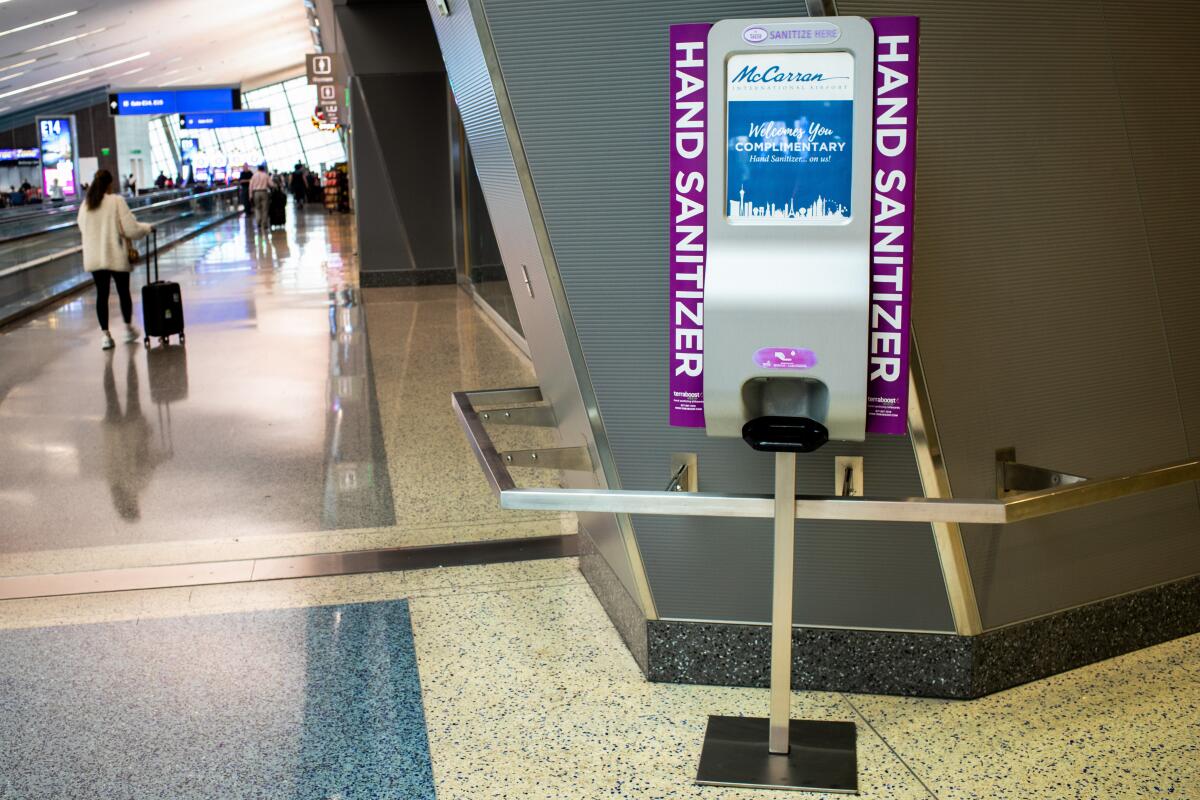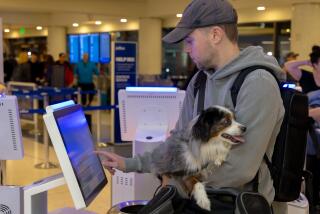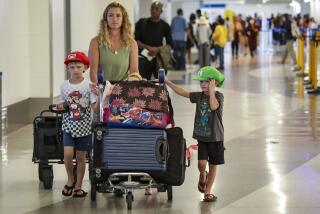Op-Ed: Coronavirus has something to teach us about how to save the planet — by staying put

- Share via
It’s stunning how a pandemic can destabilize seemingly unbreakable social norms and habits. Flying anywhere anytime, and cheaply, has been considered a divine right in the global order, certainly among citizens in the developed world and now among the newly rich of the global south. The number of passengers flying skyrocketed from fewer than half a billion in the late 1990s to more than 4.3 billion in 2018.
Yet here we are, with the coronavirus forcing a massive reduction of global air travel. Airlines, tour companies, hotels and every other service industry that depends on a freewheeling and free-spending, footloose population are facing lost profits that will likely amount to the hundreds of billions of dollars.
As it happens, a lot less flying is required if we are to stabilize a non-nightmarish planetary climate for our children, our grandchildren and their children.
The spread of the novel coronavirus comes in the wake of an unvarnished report on how to ameliorate climate change that was commissioned by the United Kingdom and published in November. Called “Absolute Zero,” the report, drafted by a group of scientists from the universities of Cambridge, Oxford, Nottingham, Bath and the Imperial College London, advised how Britain could reach its stated target of zero emissions by 2050.
Among their conclusions: Because at present and for the foreseeable future there is no carbon-neutral alternative for the powering of planes, all air travel in the U.K. will have to decline precipitously by 2030 — 10 years from now — and cease altogether by 2050. “For some period,” the report says, “we’ll all stop using aeroplanes.”
What’s true for Britain, of course, has to be true globally — an end to air travel as we know it if the planet is to keep within the putatively safe carbon budget that holds warming to 1.5 degrees Centigrade. And one can read that conclusion another way: Present-day rates of carbon-intensive travel and tourism are among the many time bombs that industrial society has set to destroy future generations.
Obviously, flying is bad for the climate. It produces 2.5% of CO2 emissions, and the effects of aviation’s non-CO2 emissions are worse than other forms of transportation because these greenhouse gases persist at high altitudes. On top of that, air travel has been increasing between 4% and 5% a year, while tourism as a whole, according to research published in Nature Climate Change, already constitutes some 8% of carbon emissions.
Viewed from the perspective of the coming climate apocalypse, much of our flying is narcissistic, wasteful and unnecessary. Jet-setting and even mere vacation travel is too often a luxury, a form of conspicuous display, born of a blinkered attitude of carbon entitlement.
With the coronavirus, travel bans are in place and travel-heavy events from March Madness to high-end art fairs as well as academic conferences, weddings and funerals are on hold, reduced or canceled. As the virus peaked in China, once teeming travel and spending hot spots all over Asia “emptied out,” reported the New York Times. In Washington state, site of the biggest outbreak in the U.S. so far, Seattle restaurants have closed for the duration, Pike Place Market is quietand the city’s first two cruise season sailings called off.
The virus quickly forced a decline in flights in China after the outbreak was first reported there. A New York Times infographic tracked the three-week period from Jan. 23 to Feb. 13, as the number of daily departures and arrivals for domestic and international flights in and out of China plummeted from 15,072 to 2,004. Even before President Trump put Europeans under a U.S. travel ban, the International Air Transport Assn. was estimating the virus would cost international airlines as much as $113 billion.
The assorted economic and cultural effects of transportation cutbacks and tourism slowdowns will be real and painful. But our society, exercising wisdom in the face of big picture realities and the pandemic, now has an enforced opportunity to assess the true costs of flying. The coronavirus may finally cause us to see air travel for what it is, a fuse burning in the climate bomb.
We have to start thinking now — right now, today, as you read this — about a livable, equitable future for our children, and for that future to be realized we must embrace a world thatthe coronavirus, perversely, is laying out for us. It is a world of less travel, less consumption, one not pathogen-determined but instead created by our own collective self-restraint, humility and altruism.
If we learn from the coronavirus, generations to come will thank us.
Christopher Ketcham’s latest book is “This Land: How Cowboys, Capitalism, and Corruption Are Ruining the American West.”
More to Read
A cure for the common opinion
Get thought-provoking perspectives with our weekly newsletter.
You may occasionally receive promotional content from the Los Angeles Times.










